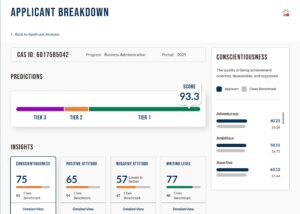With standardized testing losing steam and affirmative action ending, admission officers have to adapt new critical frameworks to study potential students’ fit at a given institution. Enter “holistic admission” or “holistic review,” higher education’s biggest buzz phrase in this next application cycle.
More than 90% of institutions claim to review student applications holistically, but the exact formula is hard to nail down from one institution to another. For example, Stanford University’s process is guided by context, academic excellence, intellectual vitality and extracurricular activities. Meanwhile, medical schools often adopt the “Experiences-Attributes-Metrics” formula, according to the Association of American Medical Colleges.
Using context as the linking thread
While formulas can change from institution to institution, contextualizing student achievement is the common thread linking each one together. The College Board sees contextualization as “reflect[ing] accomplishments and potential contributions of each applicant in light of his or her background and circumstances.”
New research out of the University of Michigan found that weighing high school grades and standardized test scores in context with the availability of resources at the school, neighborhood and family levels “are strongly associated” with students’ college success. Not only can institutions enroll a diverse student body, but they can also improve their retention and graduation rates, said Michael Bastedo, associate dean of research and graduate studies at U-M.
“These findings extend our knowledge of the relationship between students’ contextualized high school performance and college success, which has so far mostly been limited to studies of class rank,” he said, according to a statement. “This is particularly important as more institutions read applications in context as part of their holistic admissions practices.”
Nevertheless, skeptics of holistic admissions might point to its qualitative nature as being too amorphous a formula to defend under scrutiny. In SFFA v. Harvard, Students For Fair Admissions Inc. argued that Harvard used its holistic admissions practice to disguise its ulterior motive of discriminating against Asian applicants.
“Holistic is a code word for ‘subjective,’ where admission officers under the gun to find more students from underrepresented minorities show them preference in admission,” wrote Richard K. Vedder, a senior fellow at the Independent Institute, a public-policy research and educational organization.
More from UB: The U.S. News exodus never happened. How did the top ranking service outlast naysayers?
Creating tangible data from students’ qualitative assets
Institutions can defend their admissions practice from being subjective by introducing technological tools, such as AI. Student Select’s machine learning software can create a psychometric assessment of students based on their personal statements and college essays. Specifically, the software can scale students’ levels of conscientiousness, positivity, resilience and other factors that institutions can personalize to their school.
“AI tools have shown great promise in introducing unbiased assessments into the admissions selection process. This includes AI tools that analyze admissions essays, personal statements or interviews that measure important attributes like leadership, critical thinking and personality traits in a consistent and unbiased manner,” wrote Will Rose, chief technology officer at Student Select, in an email. “These new, unbiased data points can help colleges identify and accept quality applicants who may otherwise fall short of traditional selection criteria, like test scores.”

Additionally, Mary Baldwin University’s Anesthesiology Program partnered with Acuity Insights to “test” students’ soft skills. The Casper test measures students’ adaptability, communication, collaboration, empathy, professionalism and teamwork in an almost two-hour assessment to ground MBU’s officials’ understanding of how their prospective nursing students can handle personal and professional challenges.
“The decision to include Casper in our application process was driven by our desire to select candidates who demonstrate not only academic excellence but also the right personal qualities and ethical values that align with our university’s mission,” says Jennifer McPherson, program director of the nurse anesthesiology program at MBU’s Murphy Deming College of Health Science, in a press release.







